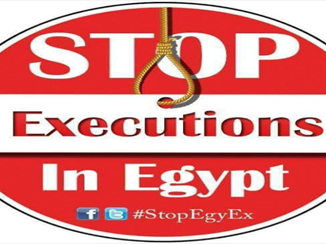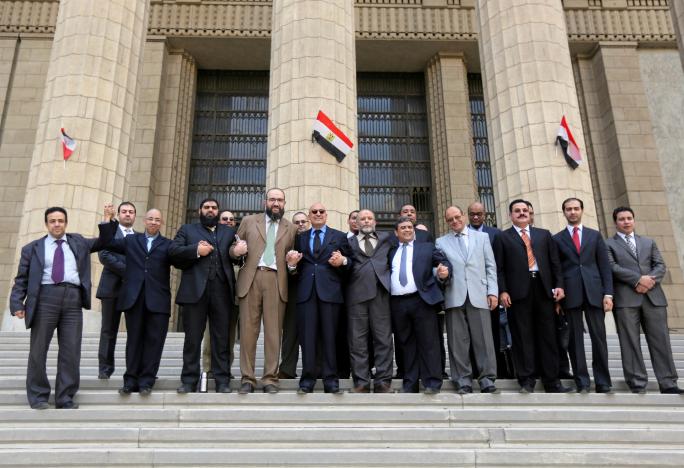
The Egyptian authorities have arbitrarily detained and prosecuted dozens of peaceful protesters in demonstrations since the beginning of October 2023, Human Rights Watch stated.
“The authorities should remove overwhelming restrictions on the right to peaceful assembly, release all those detained solely for joining or calling for peaceful protests, and drop charges against them.”
The arrests stemmed from nationwide protests, some spontaneous and others coordinated, expressing pro-Palestinian solidarity over the hostilities in Gaza, as well as a protest in North Sinai related to the right to land, a gathering in connection to the presidential vote scheduled for December, and a teachers’ protest objecting to job disqualification policies.
“The Egyptian authorities should immediately release all detained peaceful protesters and allow Egyptians to channel their concerns peacefully,” said Amr Magdi, senior Middle East and North Africa researcher at Human Rights Watch.
“The severe, longstanding repression robs people of their ability to freely express their opinions on significant ongoing events.”
Between October 20 and 24, security forces detained at least 72 people, including 4 children, who participated in nationwide Palestinian solidarity mass protests in Cairo and Alexandria, according to a list published by the Egyptian Commission for Rights and Freedoms (ECRF), a leading independent Egyptian group.
In one recent protest on October 27, following Friday prayers at al-Azhar Mosque, security forces cordoned off pro-Palestine protests and prevented other people from joining, based on videos posted by activists and journalists as well as media reports.
The police ordered protesters to disperse after the prayers, after which they and other men in civilian clothes attacked those who stayed or chanted with sticks and batons, arresting some.
Since the escalation of hostilities between Israel and Palestinian armed groups in Gaza after October 7, spontaneous pro-Palestinian protests have broken out at several universities and large mosques. In what appears to be an attempt to absorb popular protests within a frame supportive of the government, pro-government media and political parties supportive of Egypt’s Abdel Fatah al-Sisi endorsed protests on October 20 after Sisi made statements implicitly encouraging them.
Government supporters framed the protests as a “public authorization” for Sisi to “take all measures” to protect Egyptian national security.
However, in several protests, protesters’ chants echoed discontent with Sisi as well as demands for social justice and freedom. Videos showed hundreds of protesters flooding Cairo’s Tahrir Square on October 20 after overcoming an Interior Ministry security cordon.
A 63-year-old participant in the October 20 protest after the Friday prayer at al-Azhar Mosque marched with others to Tahrir Square. She told Human Rights Watch that during the protest, demonstrators chanted, “This is a real protest, not authorized by anyone [such as Sisi].” She said that when the protesters arrived at Tahrir Square, security forces and men in civilian clothes pushed them out of the square, chased protesters through the surrounding streets, and randomly arrested people.
Security agencies also arrested several activists they believed were connected to the protests at their homes. A family member of a 23-year-old man who took part in the October 20 Tahrir Square protest said that officials arrested him without a warrant at his home on October 21 and held him incommunicado until October 28, when they brought him before a prosecutor. The authorities denied knowledge of his whereabouts when lawyers inquired about him in nearby police stations.
As of October 30, the ECRF said that authorities had brought 52 detainees connected to protests before prosecutors, while releasing 14 others without charge after up to three days in detention. The whereabouts of six of these detainees remained unknown, but they are likely being held incommunicado, ECRF director Mohamed Lotfy told Human Rights Watch.
According to lists of detainees collected by the group and a list of charges collected by the Egyptian Front for Human Rights (EFHR), another independent group, and shared with Human Rights Watch, a group of 16 protesters, most of whom were arrested in or near Tahrir Square, appeared before the Supreme State Security Prosecution (SSSP), which ordered all of them to be kept in pretrial detention. They faced charges of “joining a terrorist group,” participating in “illegal assembly,” “committing a terror act,” and vandalism.
In Alexandria, the SSSP on October 22 ordered 14 people arrested in connection with pro-Palestine protests to be held in pretrial detention pending investigation on similar charges. Lotfy and a source at the EFHR, who spoke with sources familiar with the investigations, said that authorities presented no evidence of a criminal offense in any of the cases. Human Rights Watch found no allegation of violence in government-affiliated or independent media reports.
Throughout October, security forces have violently dispersed and detained protesters at other separate anti-government peaceful gatherings.
The Sinai Foundation for Human Rights (SFHR), an Egyptian rights group, said that on October 23 army forces violently dispersed a gathering of Sinai residents who demanded the return to their confiscated lands close to the border with Gaza and Israel.
Human Rights Watch has documented that the Egyptian military has unlawfully evicted tens of thousands of North Sinai residents since 2013 under the pretext of battling an Islamic State-affiliated armed group. Ahmed Salem, the SFHR director, told Human Rights Watch that the military detained several protesters who might face military prosecution. He also said that five injured protesters were hospitalized.
On October 15, security forces detained at least 10 men and 3 women after dispersing hundreds of teachers who gathered in front of the Education Ministry in the new administrative capital east of Cairo to protest the mass disqualification of thousands of teachers who applied for public school jobs, according to social media videos and media reports.
The reports said that security forces beat protesters, used water cannons to disperse them, and forced female teachers into buses to remove them from the protest.
The disqualified teachers said they met all requirements for the advertised jobs but were rejected following a newly required “verbal interview” at the Military Academy by military officers. The Egyptian Initiative for Personal Rights (EIPR), a leading rights group, said that on October 17 the SSSP ordered 15-day pretrial detention for 14 men and women pending investigation on charges of “joining a terrorist group,” participating in an illegal assembly, and “spreading false news.”
The group said at least two of them were arrested at home for allegedly being part of Facebook groups that mobilized the teachers. On October 24, prosecutors renewed the detention of all or some of the 14 detainees using a remote video conference system, which Human Rights Watch has found is inherently abusive and undermines due process.
On October 2, an unplanned anti-government protest took place in Marsa Matrouh city, near the western border with Libya, during a political event organized by pro-Sisi political parties to celebrate his presidential bid. The Arabic open-source investigation platform Saheeh Masr said they verified videos that showed protesters chanting against Sisi and taking down placards with his photos. Security forces violently dispersed the protest, detaining dozens.
Lawyers in Marsa Matrouh, cited by Mada Masr, said that prosecutors ordered that 51 protesters be released and held 16 in pretrial detention on charges of vandalism, illegal assembly, and rioting. The Interior Ministry claimed in a short statement that the incident was a “fight between some youngsters competing to take photographs with Libyan poets.”
Sisi’s government has shown complete intolerance for peaceful protests and used restrictive laws to effectively criminalize the right to peaceful assembly and prosecute protesters. The 2013 anti-protest law has been used as a blanket ban on protests, resulting in tens of thousands being detained or prosecuted.
Article 21 of the International Covenant on Civil and Political Rights, to which Egypt is a party, enshrines the right to freedom of peaceful assembly. It states that no restrictions can be placed unless precisely prescribed by law and if they “are necessary in a democratic society in the interests of national security or public safety, public order, the protection of public health or morals or the protection of the rights and freedoms of others.”
Any restrictions on peaceful assembly must be indiscriminatory, proportionate, justified on a case-by-case basis, and must not negate the essence of the right. Blanket bans are presumptively unlawful.
“The Egyptian government showed rare, relative tolerance to mass protests on October 20 when Sisi greenlighted them, but shut them down as soon as protesters voiced criticism,” Magdi said.
“Egyptians’ right to peaceful assembly should not be tied to Sisi’s blessing.”



